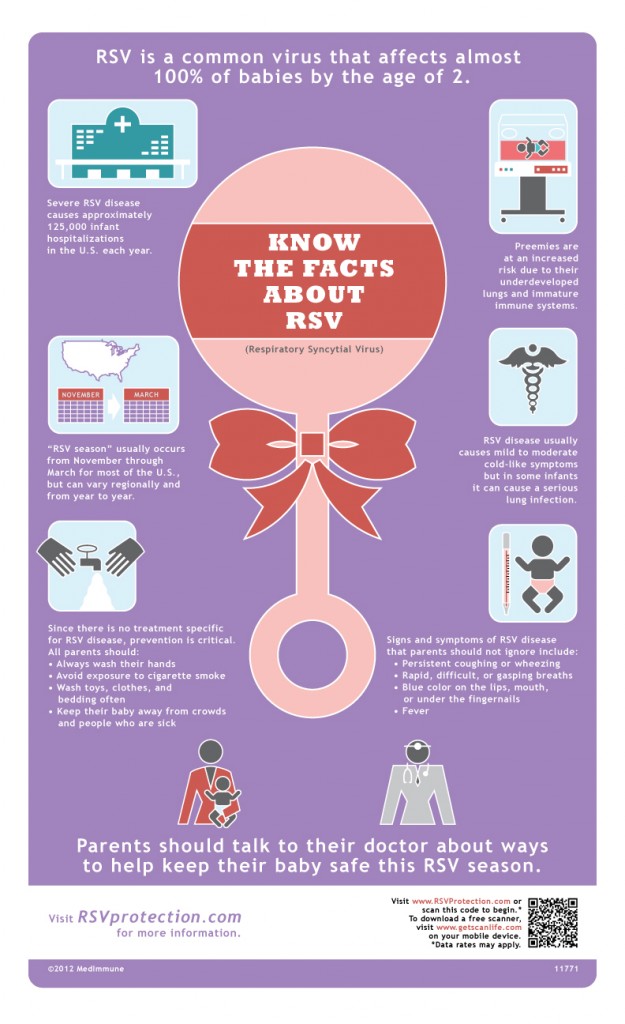I consider myself very lucky. Lucky, because our little one was born precisely on her due date. Her punctuality is something only about five percent of babies experience, but did you know that about 12 percent of babies are born prematurely (defined as any baby born before 37 weeks)?
Because they’re born early, preemies’ immune systems and lungs are often not fully developed, placing them at an increased risk of respiratory problems. Among those problems is something called respiratory syncytial virus (RSV). Most children contract RSV before the age of two, which usually resembles a cold, but premature babies are at a risk of much more severe symptoms.
I’m ironically late in noting that November 17 was Preemie Awareness Day, but that doesn’t make the following RSV facts any less important.
RSV Quick Facts
- RSV is the leading cause of infant hospitalization, and severe RSV disease causes up to 10 times as many infant deaths each year as the flu.
- RSV is most prevalent during the winter months. The CDC has defined the “RSV season” as beginning in November and lasting through March for most parts of North America.
- In addition to prematurity, common risk factors include low birth weight, certain lung or heart diseases, a family history of asthma and frequent contact with other children.

Prevention is Key
RSV is very contagious and can be spread easily through touching, sneezing and coughing. Since there’s no treatment for RSV, parents should take the following preventive steps to help protect their child:
- Wash hands, toys, bedding, and play areas frequently
- Ensure you, your family, and any visitors in your home wash their hands or use hand sanitizer
- Avoid large crowds and people who are or have been sick
- Never let anyone smoke near your baby
- Speak with your child’s doctor if he or she may be at high risk for RSV, as a preventive therapy may be available
Know the Symptoms
Contact your child’s pediatrician immediately if your child exhibits one or more of the following:
- Severe coughing, wheezing or rapid gasping breaths
- Blue color on the lips, mouth, or under the fingernails
- High fever and extreme fatigue
For more information about RSV, including symptoms, download the World Preemie Day/RSV Awareness fact sheet or visit RSVProtection.com. #PROTECTPREEMIES
I wrote this review while participating in a campaign for Mom Central Consulting on behalf of MedImmune and I received a promotional item to thank me for my participation.







I have several friends who’ve had babies be diagnosed with RSV. I hear it can be quite scary. Thank you for providing such useful information!
This is a wonderful post with great information. Thank you for sharing..
great post…we went through RSV with my youngest and it was very scary!
I can’t even imagine. Glad your little one is ok!
Thanks for this awesome post and great information. Passing it along to others!
Thanks for sharing, David! Such an important message!
Thanks for sharing!
great post. My niece just had a baby 6 weeks early. This is great information.
It really is so scary. I’m happy to help spread the word!
great info. i don’t have a premie so it’s nice to know this. thanks for sharing
It’s so important that parents are aware of RSV. My son had it when he was just 8 months old. It was a terrifying experience. Getting him emergency medical help saved his life. Thank you for sharing.
Oh gosh! My daughter had it around 2. I can’t imagine how scary that would be for a tiny baby! Glad your little guy is ok!
How scary it must be for parents of infants with RSV! This needs to be brought to light. Thanks for informing us!
I can’t imagine. My daughter got it right before she turned 2. I can’t imagine how hard it is on little babies.
Mason had constant RSV which caused broncilitis all through his first year. what a nightmare!! He was almost hospitalized and he was only 2 weeks early. What a hard year. Not fun at all.
RSV can be so scary! I had a January baby so I was always keeping a good eye on him. My niece did spend some time in the hospital with RSV…not fun!